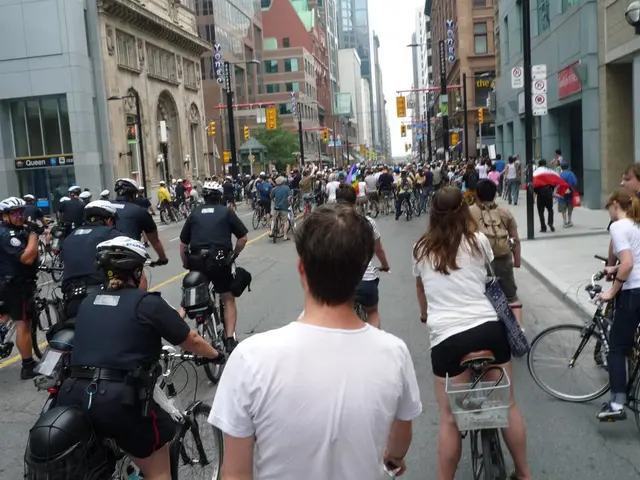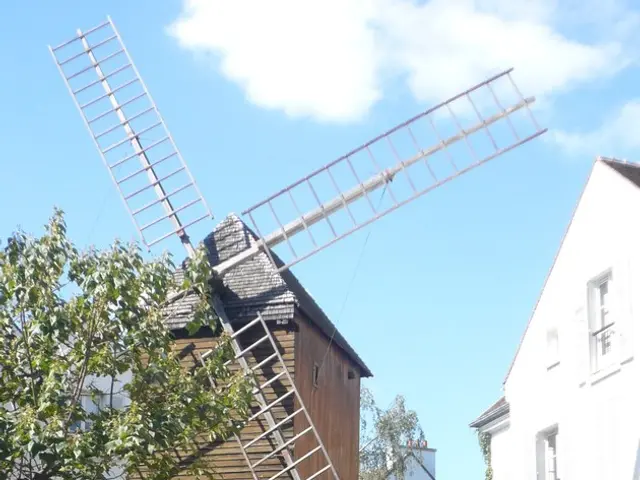Constructing durable and eco-friendly urban landscapes
Climate-Resilient Urban Development in Rhineland-Palatinate: Leveraging Conversion Areas
In Rhineland-Palatinate, the transition of traditional industrial sites into eco-friendly urban quarters presents a unique opportunity for sustainable urban development. One such project, the Pfaff Quarter in Kaiserslautern, serves as a beacon of hope and a template for urban regeneration efforts.
Conversion Areas: A Platform for Climate-Resilient Urban Development
As climate change, land scarcity, and increasing housing demand mount, the revitalization of conversion areas assumes significant importance. These zones - formerly military, industrial, or commercial sites – provide immense potential while posing planning challenges. With over 630 military properties encompassing around 13,000 hectares released since 1990, Rhineland-Palatinate boasts a wealth of conversion opportunities.
Navigating Complex Conversion Challenges
The conversion of conversion areas necessitates expertise in urban planning, site remediation, heritage protection, and property management. Integrating diverse topics, including energy, mobility, the environment, and social infrastructure, is crucial. However, the substantial financial burden remains the principal hurdle for municipalities.
The climate-friendly development of such areas demands early consideration of climate goals, energy supply, mobility concepts, and green infrastructure. Traditional land-use planning is no longer sufficient; integrated, cross-sectoral approaches – often in collaboration with institutions like the Energy Agency Rhineland-Palatinate – are required.
Renewal of the Former Pfaff Site: A Model for Sustainable Transformation
The repurposing of the Pfaff Quarter exemplifies how industrial sites can evolve into diverse, climate-neutral urban precincts. Once home to the renowned Pfaff sewing machine factory, the site is undergoing transformation into a vibrant, mixed-use neighbourhood. After production ceased in 2009, the city of Kaiserslautern acquired the 17-hectare property in the heart of the city in 2014.
The planning prioritizes a mix of residential, commercial, and industrial uses alongside innovative heating systems. The preservation and adaptive reuse of selected historic structures contribute to the quarter's identity. Due to the deteriorated building fabric and extended periods of disuse, as well as hazardous substances, most buildings were demolished.
Climate-Friendly Mobility and Energy Systems
The Pfaff Quarter's energy supply will be powered by a quarter-specific system with a high proportion of renewable energy sources, supported by intelligent storage and control technologies. Climate-friendly mobility options, including car-sharing, cycling infrastructure, and public transport, are integral components of the plan.
Hurdles in Climate-Appropriate Development
Despite ambitious objectives, development challenges abound, echoing experiences familiar to many municipalities. Site remediation and building maintenance are key issues, as soil contamination and aged structures routinely plague formerly industrial zones.
Creating Sustainable Urban Spaces from Conversion Areas
Effective utilization of conversion areas requires adherence to innovative urban planning, integration with natural systems, active community engagement, and economic revitalization. By addressing these challenges and adopting a forward-thinking approach, Rhineland-Palatinate can render its cities more resilient to climate change while fostering improved quality of life.
Sustainable living can be promoted through the transformation of conversion areas, such as the Pfaff Quarter, into eco-friendly urban quarters. This process requires expertise in various fields including urban planning, site remediation, heritage protection, and property management. The renewal of such areas calls for a focus on climate-friendly development, energy supply, and mobility concepts. By adopting a forward-thinking approach, conversion areas can serve as platforms for climate-resilient urban development, contributing to improved environmental-science and enhancing the lifestyle of residents through home-and-garden and sustainable-living initiatives.






